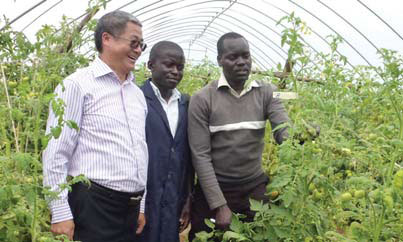Agriculture expert puts down roots in Kenya

When Liu Gaoqiong was dispatched to Kenya's Egerton University to join a Chinese government education program in 1997, he admits he originally thought it would be a hardship post.
Today, he is married to a Kenyan woman, with whom he has three daughters, and says the country is his second home. He has even been accepted as a son of his wife's tribe, the Kalengi.
The 52-year-old agricultural professor is now devoted to relieving Kenya's food security problems: "I live my life to the fullest here, and there is still a lot that I can do."
| Liu Gaoqiong has been in Kenya since 1997 and often goes to Kenyan farms to help farmers with problems they encounter. Hou Liqiang / China Daily |
Liu, who previously worked at Nanjing University of Agriculture, says he found Kenya to be "pleasantly different" from his expectations when he arrived and that the people were friendly.
Yet despite his solid knowledge and practical experience, he says he found it difficult at first to teach in English at Egerton, the main campus of which is in Njoro, about 180 kilometers northwest of Nairobi. "Sometimes my students and I just looked at each other, confused," he recalls.
He had to spend much more time on lesson plans than he had in China and had to use several dictionaries to find explanations for technical terms his students would understand.
In addition to teaching at undergraduate and graduate's level, he conducts scientific research, manages Egerton's Horticultural Research Center, acts as a bridge between the Njoro and Nanjing universities, and manages the foreign aid training program at Egerton that is supported by China's Ministry of Education.
He can also often be seen in rural areas, training farmers and local agriculture officials, and participating in pest prevention and control, which can bring fresh challenges. For example, last year, the vegetable leaf miner, a pest not indigenous to Kenya, wreaked havoc in the country. Liu and his colleagues helped develop a way for farmers to stop the pest from spreading.
Although the scientific research conditions in Kenya are not perfect and receive limited funds, Liu says he is proud, as his students are putting their skills to use across Kenya and even in other African countries.
"When I arrived, I found many managers of Kenyan farms were Europeans. Now many of them have been replaced by graduates from Egerton."
Liu has helped more than 1,000 students graduate from the university.
Away from the school, the professor is also director of the Kenya Overseas Chinese Association in Nakuru county, which administers Njoro, and is a member of the local Lions Club.
"My schedule is so tight that I often forget to do things," he says. He manages thanks to support from his wife, Elizabeth Chepkemboi, whose parents worked at Egerton before retiring.
"I'd been in Kenya for five years before I met Elizabeth. With a proper understanding of cultural differences, we've found no big problems communicating," Liu says.
houliqiang@chinadaily.com.cn
(China Daily European Weekly 03/18/2016 page19)
Today's Top News
- Takaichi must stop rubbing salt in wounds, retract Taiwan remarks
- Millions vie for civil service jobs
- Chinese landmark trade corridor handles over 5m TEUs
- China holds first national civil service exam since raising eligibility age cap
- Xi's article on CPC self-reform to be published
- Xi stresses improving long-term mechanisms for cyberspace governance































